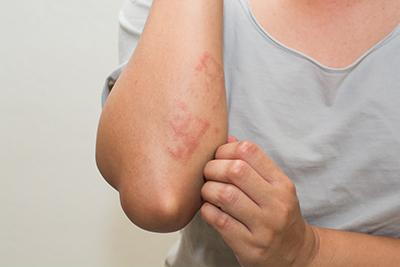Ringworm: What to know and do
Ringworm is a common skin infection that is caused by a fungus. It’s called “ringworm” because it can cause a circular rash (shaped like a ring) that is usually red and itchy. Anyone can get ringworm. The fungi that cause this infection can live on skin, surfaces, and on household items such as clothing, towels, and bedding.
Ringworm (also called tinea or dermatophytosis) is a very common fungal infection of the skin and nails that has nothing to do with worms. The condition is called ringworm because it tends to cause an itchy, red, circular or ring-shaped rash, according to the Centers for Disease Control and Prevention (CDC).
Ringworm is a common, usually harmless fungal infection in children.
Also see: Skin Rash - Symptoms, Causes & Treatment Options
Are there other types of tinea infections?
There are many different kinds of tinea skin infections, named in Latin for the part of the body they affect, such as the
- scalp (tinea capitis)
- groin (tinea cruris)
- feet (tinea pedis)
- body (tinea corporis)
Tinea infections can look a bit different depending on what part of the body they affect, but they are usually pink or red and scaly.
How do you get ringworm?
Tinea infections, particularly ringworm (tinea corporis), are very common. People catch them from other infected people and also from infected animals, particularly dogs and cats. They can also spread from one part of the body to another.
Also see: Cellulitis Emergency: When to go to the ER
What does ringworm look like?
It usually starts as a pink scaly patch that then spreads out into a ring. The ring (which is not necessarily perfectly round) usually spreads wider with time. It can sometimes be itchy, but most of the time doesn't cause any discomfort.
There are other rashes that can have a ringlike shape, so it's always important to check in with your doctor, especially if the ring isn't scaly. But most ringlike rashes are tinea.
How is ringworm treated?
Luckily, tinea corporis and the other kinds of tinea are very treatable. Most of the time, an antifungal cream does the trick.
When the rash is extensive (which is rare) or doesn't respond to an antifungal cream (also rare), an antifungal medication can be taken by mouth.
As is the case with many other germs these days, there are some drug-resistant cases of tinea related to overuse of antifungal medications. But the vast majority of fungal infections go away with medication.
What should you do if you think a family member — or a pet — has ringworm?
If you think someone in your family has ringworm, call your doctor. The sooner you get started on treatment, the better.
If someone in the family has been diagnosed with ringworm, make sure that others don't share clothing, towels, or sheets. Have everyone wash their hands frequently and well.
If your pet has a scaly rash, call the vet. Vacuum the areas your pet frequents, and have everyone wash their hands after touching the pet.
Also see: Common Causes of Hives That Will Surprise You
Can you prevent ringworm?
To prevent tinea corporis and other kinds of tinea:
- Keep skin clean and dry
- Change clothes (particularly socks and underwear) regularly
- Wash your hands regularly (this helps prevent all sorts of infections)
- If your child plays contact sports, make sure they shower after practice, keep their uniform and gear clean, and don't share gear with other players
Also see: Monkeypox : Everything You Need to Know
If you have a skin rash like ringworm, itching, and red to brownish-gray patches on the skin, visit or call the Nearest Emergency Room for the medical help. We have experienced physicians, and staff to help you recover from skin infection.
We have ER locations across the DFW metroplex that are open and here to help you 24/7 If you or your family have a medical emergency.
We have 9 facilities spread across the DFW area with average wait times of less than 10 mins that are OPEN 24/7 located in Hurst, Colleyville, Frisco, Highland Village, Hillcrest, Uptown, Little Elm, Mansfield, and Texoma.



.jpg)